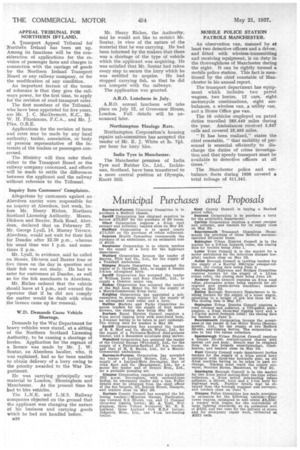APPEAL TRIBUNAL FOR NORTHERN IR FLAND.
Page 44

If you've noticed an error in this article please click here to report it so we can fix it.
A Transport Appeal Tribunal for Northern Ireland has been set up. Among its functions will be the consideration of applications for the revision of passenger fares and charges in connection with the carriage of goods by the Northern Ireland Transport Board or any railway company, or for the modification of any condition.
An important feature of the terms of reference is that they give the railways power, for the first time, to apply for the revision of road-transport rates.
The first members of the Tribunal, who have been appointed for five years, are Mr. J. C. MacDermott, K.C., Mr. W. H. Fitzsimons, F.C.A., and Mr. J. Pike, O.B.E.
Applications for the revision of fares and rates may be made by any local authority, trader, association, or body of persons representative of the interests of the traders or passengers concerned.
The Ministry will then refer them either to the Transport Board or the railway company concerned, and efforts will be made to settle the differences between the applicant and the railway without reference to the Tribunal.
Inquiry Into Customers' Complaints.
Allegations by customers against an Aberdeen carrier were responsible for an inquiry at Aberdeen, last week, before Mr, Henry Riches, Northern Scotland Licensing Authority. Messrs. Dickson and Baxter, Raik Road, Aberdeen, declared that on February 27, Mr. George Lyall, 14, Murray Terrace, Aberdeen, would not wait for their fish for Dundee after 12.20 p.m., whereas his usual time was 1 p.m. and sometimes 2 p.m.
Mr. Lyall, in evidence, said he called on Messrs. DiCason and Baxter four or five times on the day in question and their fish was not ready. He had to cater for customers at Dundee, as well as for the fish merchants in Aberdeen.
Mr. Riches ordered that the vehicle should leave at 1 p.m., and warned the operator that if he did not comply the matter would be dealt with when the licence came up for renewal.
W.D. Demands Cause Vehicle Shortage.
Demands by the War Department for heavy vehicles were stated, at a sitting of the Northern Scotland Licensing Authority, to be causing a shortage of lorries. Application for the regrant of a licence was made by Mr. J. W. Soutar, an Aberdeen haulier, who, it was explained, had so far been unable to obtain delivery of a lorry owing to the priority awarded to the War Department.
He was carrying principally war material to London, Birmingham and Manchester. At the present time he bad to hire vehicles.
The L.N.E. and L.M.S. Railway companies objected on the ground that the applicant was changing the nature of his business and carrying goods which he had not handled before.
Bi0
Mr. Henry Riches, the Authority, said he would not like to restrict Mr. Soutar, in view of the nature of the material that he was carrying. He had been informed by the makers that there was a shortage of the type of vehicle which the applicant was acquiring. He was satisfied that Mr. Soutar had taken every step to secure the lorry which he was entitled to acquire. He had stopped carrying fish, so that he did not compete with the railways.
The application was granted.
A.R.O. Luncheon in July.
A.R.O. annual luncheon will take place on July 12, at Grosvenor House, London. Full details will be announced later.
Northampton Haulage .Rate..
Northampton Corporation's housing repairs sub-committee has accepted the tender of Mr. E. J. White at 2s. 71d. per hour for lorry hire.
India Tyre in Manchester.
The Manchester premises of India Tyre and Rubber Co., Ltd., Inchinnan, Scotland, have been transferred to a more central position at Olympia, Knott Milk MOBILE POLICE STATION PATROLS MANCHESTER.
An observation van, manned by at least two detective officers and a driver, and fitted with wireless-transmitting and receiving equipment, is on duty in the thoroughfares of Manchester during the night. It can be rightly termed a mobile police station. This fact is mentioned by the chief constable of Manchester in his annual report.
The transport department has equipment which includes two patrol wagons, two lorries, 12 cars, eight motorcycle combinations, eight ambulances, a wireless van, a utility van, and a Home Office gas van.
The 16 vehicles employed on patrol duties travelled 283,440 miles during the year. Ambulances received 5,897 calls and covered 25,493 miles.
"It has been realized," states the chief constable, "that mobility of personnel is essential efficiently to discharge the duties of crime investigation and that speedy transport must be available to detective officers at all times."
The Manchester police and ambulance fleets during 1936 covered a total mileage of 511,341.




































































































